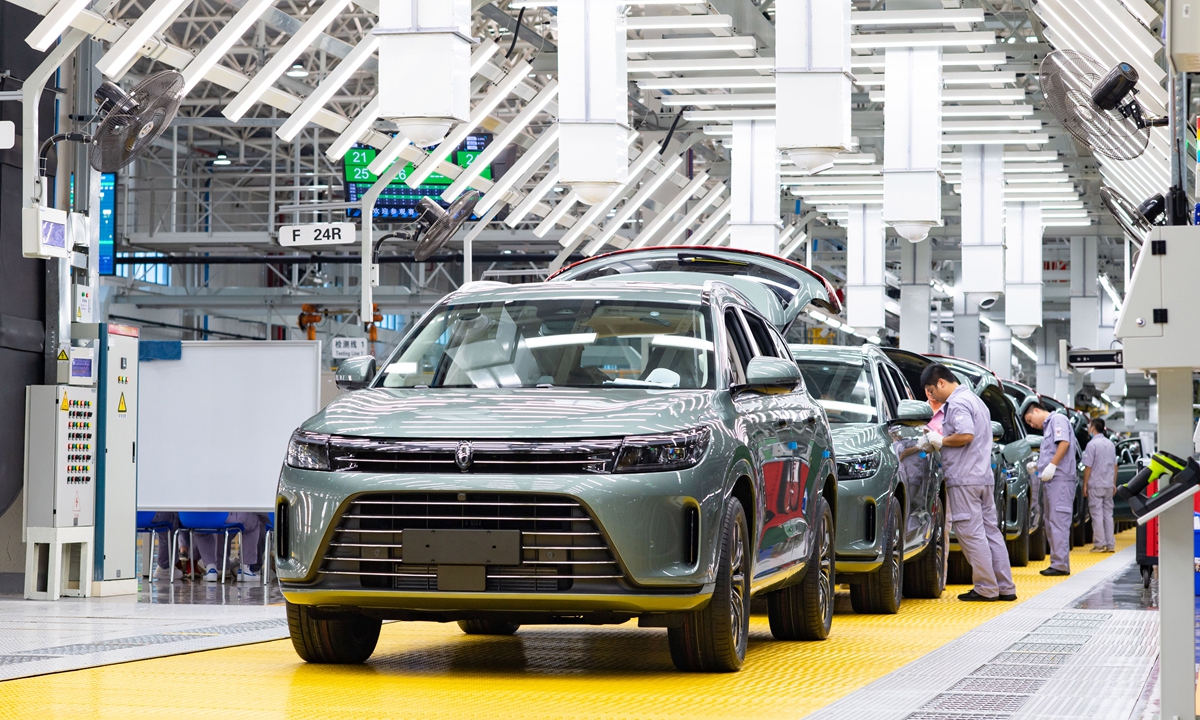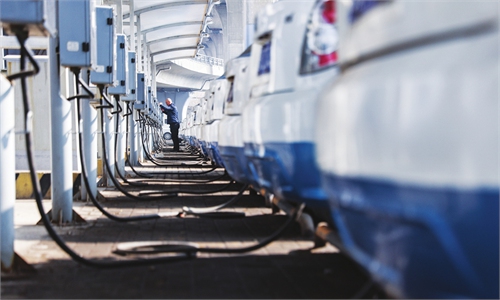Nation's NEV sector drives into fast lane
Production, domestic sale, export all estimated to surge in 2023

An NEV manufacturing line in Southwest China's Chongqing Municipality Photo: VCG
China's new-energy vehicle (NEV) sector, securing the world's top ranking in production and sales for an eighth consecutive year in 2022, has gone through a period of rapid development and is now entering its explosive growth.
Underlining the transition calls for more efforts to advance homegrown technologies in auto semiconductor chips and operating systems in addition to securing a stable supply chain of key raw materials, industry analysts and experts said, as they shared insights about the industry's further development in a major auto industry event.
China's NEV sector has achieved scale development and entered the mass popularization period, they said. However, there are still some bottlenecks such as securing raw materials for batteries and localization of auto semiconductor chips, Zhang Xiyong, general manager of state-owned BAIC Group, told the China EV100 Forum, which was held in Beijing from Friday to Sunday. China EV100 is an electric vehicle industry think tank.
Though China is home to the battery behemoth CATL, which ranked first in the world with a 37 percent market share last year, the country relies heavily on imports of lithium, cobalt and nickel.
In January and February, China imported 21,543 tons of lithium carbonate, an increase of 31 percent year-on-year, according to Chinese customs data. The material was mainly sourced from Latin American countries, with Chile accounting for 87.4 percent and Argentina for 11 percent.
Despite being the world's largest producer of cars, and the leader in the NEV sector, China relies almost entirely on chips from Europe and the US.
China was less than 5 percent self-sufficient in auto semiconductor chips as of 2021, according to industry body China Association of Automobile Manufacturers (CAAM).
As the foundation of smart cars, chips remain the top priority of the supply chain. By 2030, chips will account for more than 20 percent of the material cost of high-end cars, a five-fold increase from 4 percent in 2019. In 2030, software costs will account for 60 percent of vehicle costs from the current 15 percent, said Chen Qingtai, president of China EV100.
China's demand for auto chips will continue to grow in the years to come, which means imports need to catch up. However, the supply chain of imports can't be fully guaranteed due to geopolitical factors, so the pace of expanding domestic capability should be accelerated, experts said.
Wang Qing, a research fellow at the Development Research Center of the State Council, said during the forum that the amount of semiconductor needed by Chinese automakers will be five to six times that of the internal combustion engine cars.
China's NEV sector entered the stage of rapid popularization in 2022 when the country achieved sales of 6.89 million units, a growth of 93.4 percent from 2021, but there is still a long way to go, experts said.
"The integration and development of intelligent auto technology is still in the early stage, which calls for in-depth development," Zhang said.
Ouyang Minggao, an academician with the Chinese Academy of Sciences and a professor at Tsinghua University, said that China's comprehensive electrification transformation needs another 10 years to complete.
"2023 will be another year for NEV revolution and the deep transformation of the automotive industry," Ouyang said during the forum, adding that in the long term, there is a lot of room for battery innovation and technological progress, and the cost of batteries will continue to decline.
Cui Dongshu, secretary general of the China Passenger Car Association, predicted that NEV sales will reach 8.5 million this year, achieving a 30 percent yearly growth.
"The growth rate is slowing a little bit but exports will gain strong momentum this year," Cui told the Global Times.
A growing list of technology companies have made forays into the burgeoning NEV sector in recent years.
During the forum, Yu Chengdong, executive director of Huawei and CEO of the Smart Car Solution Business Unit, said that Huawei has always insisted that it will not produce cars but focusing on helping car companies churn out good cars.


